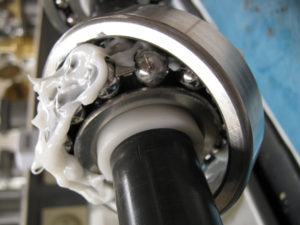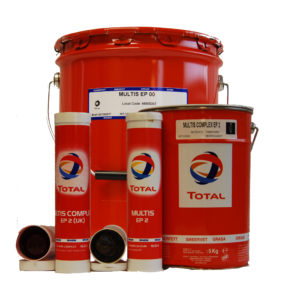The Anatomy of Grease
Lubrication, whether achieved with oil or grease, follows the same basic principles; creating an oil film between two surfaces that move relative to each other. Reducing friction between such surfaces dramatically improves efficiency and reduces wear. Reducing this direct contact saves costs on parts replacement, minimises downtime and increases the overall lifetime value of machinery.
In a sense, you can consider grease as something which acts like a sponge full of oil. The grease holds the oil and additives in place, giving it the characteristics such as water resistance or drop point. To achieve the required features, careful selection of the base lubricating oil viscosity, base type additives and fillers is essential.
As we have already seen, grease is made up of 3 essential components:
GREASE = Base Oil + Thickener + Additives
Base Oils
Base oil makes up the largest component, representing 80% – 95% by weight of a typical grease. The choice of the base fluid varies and may consist of mineral oil, synthetic oil or any fluid that provides lubricating properties. A fundamental fact to note is that the base oil portion of a grease performs the actual lubrication, except in very slow or oscillating applications.
The same rules that determine the proper viscosity grade of a fluid lubricant also apply to the process of selecting the base oil portion of lubricating grease. It is important to remember that in order for grease to lubricate any equipment it is applied to the oils must be able to “bleed.” Bleeding” is a term used to explain the separation of the lubricant from the grease in normal operating conditions. For example, if a grease has a low viscosity, you will see a greater amount of the oil separate from the grease. Therefore the grease can’t perform any better than its base oil allows as this will dictate factors such as viscosity.
Mineral oils are the most abundantly used base oils in the manufacture of grease. In most applications, mineral oils provide the much-needed lubrication when combined with a suitable thickener and additives. While paraffinic base oils are used more often in greases than naphthenic (low paraffin content), some applications receive several benefits such as improved low-temperature flow from using a blend of the two.
When used in more demanding circumstances, synthetic base oils such as poly alpha olefin (PAO) base oils are often appropriate because of their wide temperature range in both hot and cold applications.

The advantages of using PAO base oils include:
- Wider temperature range by 10°C to 20°C than other base oils
- Less viscosity loss when hot
- Greater elastohydrodynamic lubrication (EHL) film thickness
- Reduced evaporation at high temperatures
Vegetable oils are a firm ingredient in biodegradable lubricants. The term biodegradable indicates the oil is food for bacteria and thus can be easily broken down. When the lubricant comes in contact with nature, it is converted efficiently to water and carbon dioxide.
Base Oil Viscosity
A crucial factor in the performance of grease is its base oil viscosity. Choosing the viscosity is critical when factoring in the prevention of bearing wear or selecting the best lubricant based on the speed of the components to which it is to be applied.
- Low viscosity best for:
- High speed, low load and low temperatures
- High viscosity best for:
- Low speed, high load and high temperatures
The International Standards Organisation (ISO) developed a viscosity grade to establish a measurement method. If we use this system as a guideline, we can understand the type of application a grease is suited to relative to its viscosity.

Conclusion
As various industrial segments evolve,With emerging activities of industries, essential equipment needs to be highly resistant and durable. To ensure that the machines perform at the highest level, proper lubricant must be met to ensure factors like erosion, corrosion, rusting, pitting and also skewing are not an issue. Tune in next month to the next part of grease 101 and find out about the additive packs that help the grease lubricate your machinery efficiently.
For more information on our full range of grease, contact the finol team today at 01-4555484 or click here to view our full list of products.



